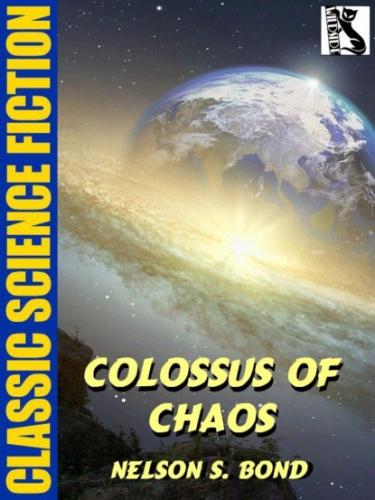Table of Contents
COLOSSUS OF CHAOS
NELSON S. BOND
COPYRIGHT INFORMATION
Copyright © 2020 by Wildside Press LLC.
Introduction opyright © 2020 by John Gregory Betancourt.
Originally published in Planet Stories, Winter 1942.
Published by Wildside Press LLC.
wildsidepress.com | bcmystery.com
INTRODUCTION
Nelson Slade Bond (1908–2006) was an American author who wrote extensively for books, magazines, radio, television, and the stage.
The 1998 recipient of the Nebula Author Emeritus award for lifetime achievement, Bond was a pioneer in early science fiction and fantasy. His published fiction is mainly short stories, most of which appeared in pulp magazines in the 1930s and 1940s. Many were published in Blue Book magazine. He is noted for his “Lancelot Biggs” series of comic space opera stories (some of which were collected in Lancelot Biggs: Spaceman, which is available from Wildside Press) and for his “Meg the Priestess” tales, which introduced one of the first powerful female characters in science fiction.
Bond’s parents, Richard Slade Bond and Mary Bond, were from Nova Scotia, but moved to Scranton, Pennsylvania shortly before his birth in that city. The family later relocated to Philadelphia after World War I. In high school, Bond reviewed plays for The Philadelphia Inquirer. He worked for an insurance company during the Great Depression before enrolling in a college. He attended Marshall College in Huntington, West Virginia from 1932 to 1934. While at Marshall, he contributed to the Huntington Herald Advertiser and edited the college newspaper, The Parthenon. He met his future wife, Betty Gough Folsom, while at Marshall, and they married in 1934.
After graduating, Bond briefly worked for his father’s public relations agency. Shortly after joining, he was offered the position of public relations field director for the province of Nova Scotia. This involved meeting celebrities visiting the province and writing pieces about them that were placed in various periodicals.
He started selling fiction when he realised he could make more money by writing, sending works to newspapers, pulp magazines, and the more upmarket “slick” magazines (so-called because they were printed on clay-coated paper, instead of the much cheaper wood-pulp paper that named the “pulp” magazines.).
He started by writing sports stories but made his first significant sale with “Mr. Mergenthwerker’s Lobblies” (actually a fantasy story) which was published in Scribner’s Magazine in 1937. His first science fiction story was “Down the Dimensions” in the April 1937 issue of Astounding. He only wrote occasional non-fiction once he was established as an author of fiction. Bond wrote and sold more for Blue Book than the pulps, which was not only more prestigious but paid more for his work.
He also published articles on philately and served on the Board of Governors / Board of Directors of the British North America Philatelic Society.
I was fortunate enough to correspond with him briefly before his death, and he became one of the featured authors in Adventure Tales, my pulp fiction magazine. He was a terrific writer and remained mentally sharp when I communicated with him about his pulp work, suggesting which works to reprint.
—John Gregory Betancourt
Cabin John, Maryland.
PROLOG
Out of the darkness It came. Out of the grim, bleak, frore, incalculable depths of outer space, into the empire of light and warmth...and life.
It was like nothing known to Man. It was round, but not quite round; It was hard, but not altogether hard; It was cold, but not cold with the terrible, utter iciness of things which come from Beyond. It was in motion but It did not move of Its own volition, for It was quiescent, insensate. It let Itself be carried by the vagrant and unpredictable whims of a kinetic universe, confident that in a day...or a century...or a thousand, thousand centuries...the fitful fingers of chance would find for It a bourne, a resting-place.
Out of the night It came...the endless, inpenetrable night which spans the void between star and star. Out of one cosmos into another; out of oblivion into waking horror.
No eye beheld Its coming. None saw Its faint, thin, cool iridescence; no voice lifted to challenge Its arrival on the sixth satellite of the sixth solar planet. It dropped to earth unwatched, rolled a brief, sluggish way, then rested in a deep, soft, sandy pit.
A gray hoar-frost rimed Its surface as the warmth of a friendly orb dispelled the frightful chill of space; a pale mist rose from Its petroid carapace and trembled into the air like a wan and restless ghost.
It had found a home, a lair, a birthing-place. With a slow, ecstatic, burrowing motion It dug Itself still deeper into the nourishing sands. It had arrived. It grew....
CHAPTER I
“A dangerous place,” said the heavy man with ominous deliberation. “A most dangerous place!” He raised his glass to his nostrils, passed it back and forth appreciatively, and rolled a single drop of the liqueur upon his tongue. A smile creased his full, red lips. “Excellent, my dear Captain!” he approved. “A most superior brandy. Allow me to congratulate you. Domrémy-Thol ’98, I should judge?”
Captain Burke, skipper of the IPS space-cruiser Gaea, basked in the sunshine of his passenger’s approbation.
He swirled the liquor in his frosted glass, glanced about the table with a self-satisfied complacency that was almost ludicrous. Then he nodded his head slowly, acknowledging the compliment bestowed upon his judgment in selecting the after-dinned liquor.
“Allow me,” he corrected, “to congratulate you, sir, on a truly magnificent palate. You have named the exact vine and season. But...danger?
